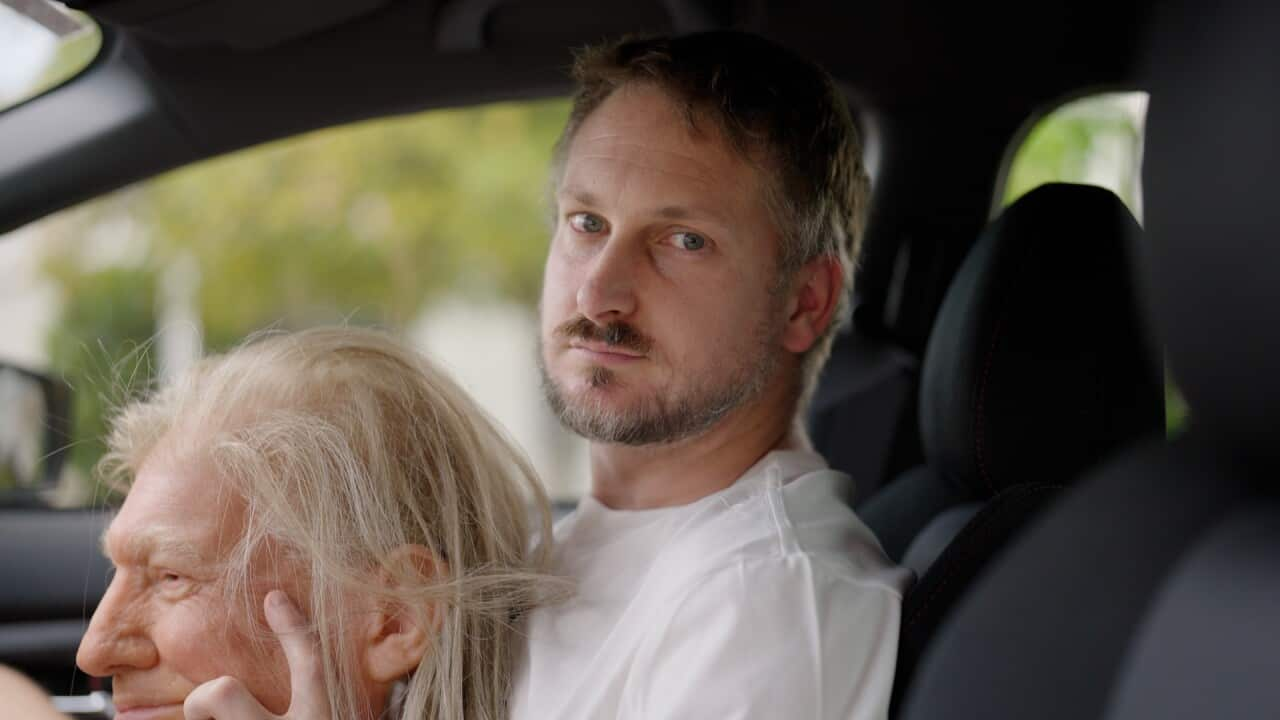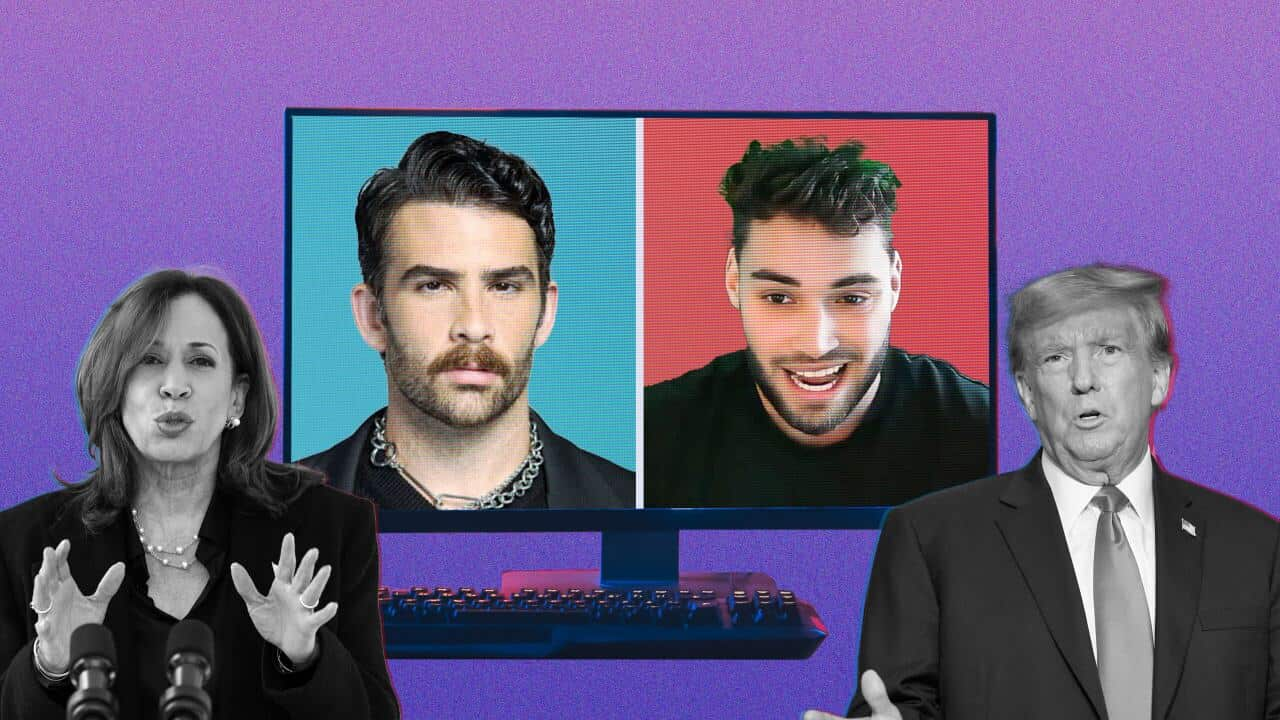When David sat down for a regular dinner with his parents and kids last month, he didn't realise it would be the last.
His father, Rodney, had pulled out a political flyer and spoke of the Donald Trump movement. David then realised they had vastly different political opinions and immediately left the house with his kids.
"After discovering [my father's political views], it made me reevaluate my relationship and opinion of him," David, 54, told The Feed.
David, from Adelaide, says he was shocked after discovering his father's views on migration and climate clashed with his own.
"I didn't realise earlier because he's my father."
Rodney, 79, is now "barely in the picture" since the incident in early 2020, and David believes his kids are better off without their grandfather’s influence. David still visits his mother, with David saying her political views are more moderate than his dad's.
But Rodney told The Feed he isn't concerned about the family conflict, and believes disagreement is a common part of family dynamics.
"It was a big argument and David left in an unhappy state of mind," he says.
"We're father and son. These incidents happen."
The risk of political echo chambers
Relationships Australia NSW CEO Elizabeth Shaw says there's been an increase in people seeking advice since the US election, with people questioning their relationship due to their partner's political views.
"I'm certainly seeing people who are repelled by some of the conversations at the moment," Shaw says.
She says it's almost impossible to avoid discussing politics due to global affairs and an interconnected world.
"Everybody is now engaged politically in one way or another, and the more dramatic the events, the more people are going to have opinions — and be expected to have opinions."
She says political beliefs are often perceived as representing someone's ideology and beliefs, which can test relationships.
"What you're really discovering is how people show up in relationships and what their philosophy of living is, and that can feel much more confronting in terms of, 'how am I going to live with this?'," she says.
Political discussion is more polarised than ever, which social media has facilitated by compressing information, according to associate professor Aaron Martin, a political scientist at the University of Melbourne.
"Social media prevents people from thinking through the complexities of the issue ... they are almost confounded by people not understanding why they're right and others are wrong," Martin says.
Generations butting heads over political movement
Despite having grown up mostly respecting Rodney's views, David says it wasn't a difficult call to cut off his father, as their political and philosophical values contradicted each other's.
"I had no issues walking away," David says.
"It was a catalyst for me realising: 'I don't have to put up with this ... He assumed everyone likes what he likes."
Alan became Donald Trump's biggest fan – and other Aussies are following suit

Alan became Donald Trump's biggest fan – and other Aussies are following suit
David says he has maintained other close relationships with people of differing political views.
"I don't care if you vote Liberal or Labor. I like discussing politics with intelligent people."
David believes Trump is "an extremist", and that the movement he leads is "harmful and detrimental" to society.
But Rodney told The Feed he supports Trump for the movement — and not the man.
"[Donald Trump]'s a horrible person — but what he represents is the pushback against the socialist mindset ... against what the Democrats stand for," Rodney says.
"I'm very anti-woke."

Some experts in Australia say avoiding difficult political conversations can lead to risks in enacting social change. Source: AAP
He says he would like to have an influence on his grandchildren's political views, believing they will become more conservative with age.
"Back when I was a teenager, I was just as progressive. You're young, you want to push the envelope, you want to change things ... and it is great, but there are realities that you have to come to terms with somewhere along the line. Gradually you realise."
But he believes things will shift in the future for his grandchildren.
"You've got to wait for them to grow up and change. If you try and force your conservative views on them, you get arguments," he says.

Gen Z couples are far more likely to be politically mismatched than any generation since the 1920s. Source: Supplied
Political mismatch growing among partners
Despite this, Australians are more likely to have partners who don’t share their political views than they did 25 years ago, based on an Australian National University study led by political scientist Intifar Chowdhury, who analysed Australian election survey data from 1996 to 2022.
It found that Gen Z and Millennials are more commonly politically mismatched than any generation since people born in the 1920s. There has been an increase of about 9 per cent of all politically mismatched couples across all generations from 1996 to 2022.
Chowdhury, a lecturer in government at Flinders University, says political party loyalty has been declining since the 1970s in Australia, as younger people prioritise specific policies over parties.
"The issues that are important [to young people] can change from election to election and they're not as loyal to one particular party as our parents or grandparents used to be. That means there's a higher chance of mismatch with the partner, depending on which election you're talking about," she says.

Intifar Chowdhury says younger people are more often voting for specific issues rather than parties.
Shaw from Relationships Australia NSW was also unsurprised by these findings due to the connected world exposing people to more ideas than ever — and says she embraces these differences being discussed.
"We need to be flexible and agile in our approach to other people and we need to be able to tolerate diversity because Australia's become an increasingly diverse place," she says.
When political differences in relationships can be positive
Open discussion provides an opportunity to bridge divides and give insights on which social media echo chambers might restrict, according to the University of Melbourne's Martin. He says cutting ties with people of differing views can threaten social cohesion.
"It's useful to continue discussion. If people stop talking, then there's no hope for anything. You've just got a civil war," Martin says.
"It's worth trying to get past what we disagree on and try and find out what we agree on. And that might provide a basis for bridging the other divides."
Shaw says differing political beliefs can also spark excitement within relationships.
"Sometimes we over-emphasise commonality. A good relationship can also withstand considerable differences. Ultimately, the test is how you manage those differences," she says.
"As sort of a healthy combative or robust exchange of ideas and yet [you] don't always agree, it's quite exciting. But you've got to work out very clearly the points of commonality and difference that are going to be sustainable going forward."
Shaw encourages people to be curious rather than reactive: saying political differences can help gain perspective and empathy.
"Trying to go on a bit of a discovery is really valuable because sometimes you find that behind the extreme view, you might be able to connect with the underlying issues, even if you had a different solution," she says.
It also presents an opportunity to teach children about life lessons and become independent thinkers by considering other views.
"Children, like all of us, are going to have to move through the world and encounter in workplaces, friendship groups, neighbourhoods, people who are different to them. The best thing you can do is to say yes: those people think differently to us," Shaw says.
"Help your children to be independent thinkers."
David says he hasn't pushed politics on his children and has no plans to: he says he's actively trying to avoid mistakes he believes his father made in pushing political opinions.
"The views we have growing up stick with us."












